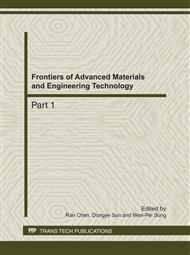p.890
p.894
p.898
p.905
p.909
p.913
p.917
p.921
p.925
Effect of Glass Fiber Modification on Tensile Strength and Shrinkage of Ceramic Mould
Abstract:
Aiming to improve the crack-resistance of the mould of ceramic mould casting, glass fibers whose average diameter was approximately 16 µm, length 1mm were dispersed, and the effect of the glass fibers on the tensile strength and shrinkage rate of the ceramic mould was investigated in this study. In the ceramic green body, quartz sand was selected as refractory, silica sol was binder. The results show that, with increasing glass fiber, the tensile strength of the ceramic mould increased linearly from 0.175 MPa to 0.221 MPa at the same sintering temperature, and the shrinkage rate fell from 1.37% to 1.33% at room temperature. With the sintering temperature rising, the tensile strength increased and the shrinkage decreased by the glass fiber dispersion, but their variation rule were not changed. The investigation proposed a new method to improve the crack-resistance of the ceramic mould, i.e., glass fiber dispersion into the ceramic mould.
Info:
Periodical:
Pages:
909-912
Citation:
Online since:
January 2012
Authors:
Keywords:
Price:
Сopyright:
© 2012 Trans Tech Publications Ltd. All Rights Reserved
Share:
Citation:


